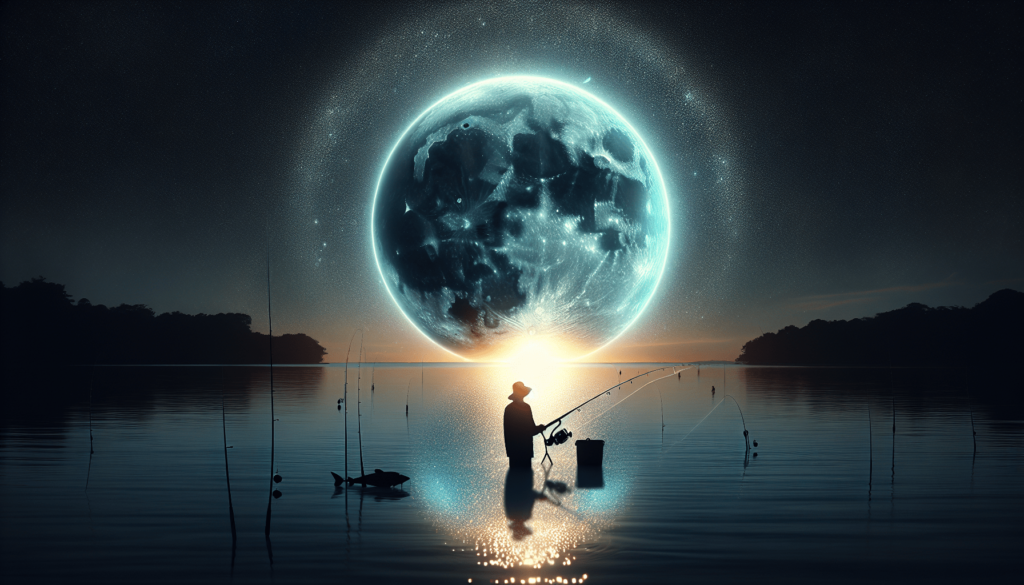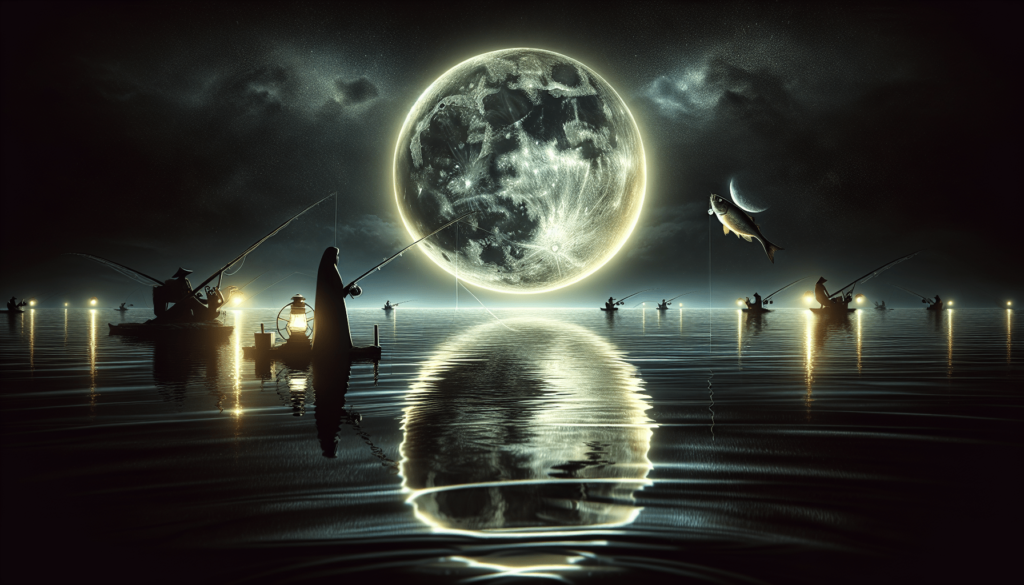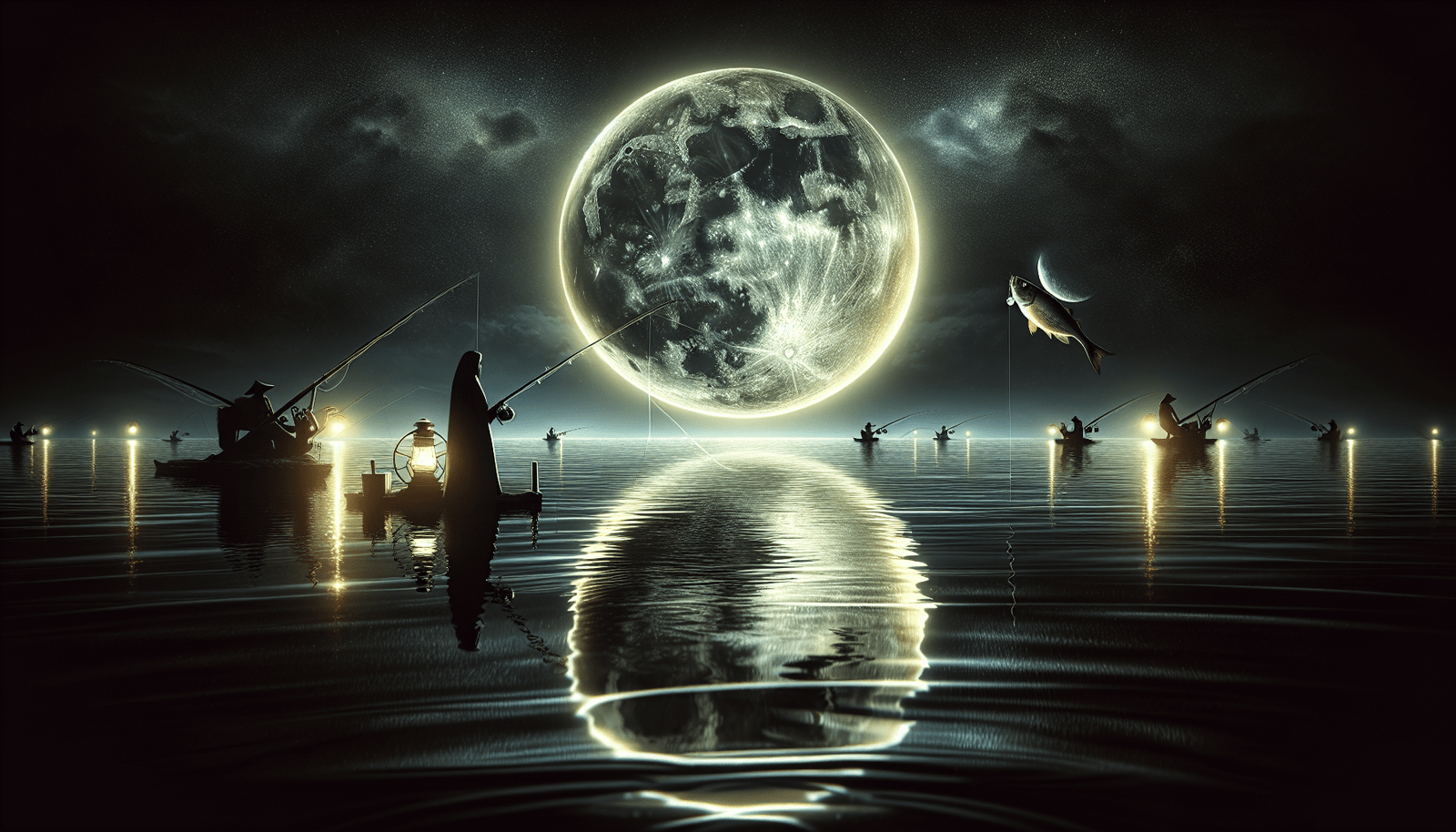Imagine embarking on a fishing adventure where the moon is your guide. “The Role of Moon Phases in Fishing Success” explores the fascinating connection between the lunar phases and your chances of reeling in a big catch. This article shines a light on how the moon’s cycle can influence fish behavior, potentially making your time spent by the water more fruitful and rewarding. Whether you’re a seasoned angler or someone looking to get their feet wet in the world of fishing, understanding this celestial influence could be the key to turning your fishing outings into memorable successes.
Overview of the Lunar Cycle
When you’re gazing up at the moon, what you’re actually seeing is sunlight reflecting off the moon’s surface. The lunar cycle is a series of phases that the moon undergoes over approximately 29.5 days. As it orbits Earth, different parts of the moon are illuminated by the sun, resulting in the phases we see from our vantage point on Earth.
Names and Characteristics of Each Phase
There are four primary phases you should know about: the New Moon, where the moon is completely in shadow; the First Quarter, with half the moon illuminated; the Full Moon, fully illuminated; and the Last Quarter, where the other half of the moon shows. Around these phases are various stages of waxing (growing) and waning (shrinking) crescents and gibbouses.
Duration and Frequency of Each Phase
Each phase lasts roughly 7.4 days but this can vary slightly due to the moon’s elliptical orbit. The entire lunar cycle takes about a month, resetting with each new moon. This predictability makes tracking the moon phases quite straightforward.
Importance of Moon Phases in Fishing
CHECK PRICES ON FISHING EQUIPMENT
Influence on Tide Levels
The moon plays a crucial role in the earth’s water movements, significantly affecting tide levels. Higher tides, influenced by the gravitational pull of the moon, can lead to increased fish activity and accessibility to spots usually out of reach during low tides.
Effect on Fish Behavior
Many anglers swear by the moon phases, claiming that certain phases can significantly influence fish behavior and feeding patterns. It’s believed that fish are more active and thus easier to catch during specific phases of the moon.
Timing the Fishing Trip According to Moon Phases
Understanding and utilizing the lunar cycle can elevate your fishing trips from good to legendary. By planning your trips around favorable moon phases, you can increase your chances of a bountiful catch.

New Moon Fishing
Characteristics of New Moon Phase
During the new moon, the moon and sun align, resulting in minimal moonlight. This phase is characterized by higher than average tides, both during the day and night.
How New Moon Affects Fish Activity
The new moon’s increased tidal forces can lead to more active fish, as they capitalize on the expanded feeding grounds brought in by the high tides.
Best Fishing Techniques During New Moon
Consider fishing in areas that are normally dry but become accessible during high tides. Using live bait can also be more effective, as fish are on the hunt for plentiful prey brought in by the tides.
First Quarter Moon Fishing
Understanding First Quarter Phase
The first quarter moon results in a half-illuminated moon, marking the midpoint between the new moon and the full moon. This phase brings moderate tides, not as extreme as during the new or full moon but still noticeable.
Impact on Fishing Conditions
The first quarter moon generates moderate fish activity. With neither high nor low tides being too extreme, fish will be on a normal feeding pattern, potentially making them easier to predict.
Strategies for First Quarter Fishing Success
A balanced approach works best during this phase. Adjust your fishing times to just before dawn and dusk when fish are more likely to feed, and consider using a mix of live and artificial baits.

Full Moon Fishing
The Attraction of Full Moon in Fishing
The full moon phase is a boon for night anglers due to the increased visibility it provides. Like the new moon, the full moon results in higher tides, stirring the underwater world into a frenzy of activity.
Behavior of Fish During Full Moon
The abundant light and high tides of the full moon can result in nocturnal feeding sprees, with fish becoming more aggressive and easier to lure.
Night Fishing Strategies Under Full Moon
Take advantage of the moonlight by using reflective lures or lighted bobbers to attract fish. Also, aim for areas where the moonlight hits the water directly, as fish are likely to be drawn to these illuminated spots.
Last Quarter Moon Fishing
Last Quarter Moon Phase Explained
The last quarter phase occurs midway between the full moon and new moon, with half of the moon’s surface illuminated. Tidal effects are similar to the first quarter but begin to diminish as the new moon approaches.
Expected Changes in Fishing Environment
The last quarter moon may result in decreased fish activity compared to the full moon phase. However, fish will still follow their regular feeding patterns, albeit less aggressively.
Approaches for Effective Last Quarter Moon Fishing
Focus on early morning or late afternoon fishing, before the day’s peak heat. Use subtle lures or bait presentations, as fish might be less aggressive and more cautious during this phase.
Lunar Brightness and Fish Visibility
Effects of Moonlight on Water Clarity
Moonlight can significantly affect how well fish can see and be seen. Clear nights with a bright moon can increase visibility underwater, influencing both predator and prey behaviors alike.
Visibility of Bait and Lures under Different Moon Phases
During darker phases, like the new moon, consider using lures that produce vibration or sound to attract fish. In brighter moon phases, visually appealing lures will be more effective.
Adapting Fishing Methods to Lunar Brightness
Adjust your fishing strategy based on lunar brightness. Night fishing is generally more productive during brighter phases, while the darker phases may require focusing on areas where ambient light increases visibility.
Tidal Forces and Moon Phases
Understanding the Correlation between Moon Phases and Tides
The gravitational pull between the Earth and the moon is the primary force behind tides. Full and new moons, when the Earth, moon, and sun are aligned, produce the highest tides, known as spring tides. Conversely, the first and last quarter moons generate neap tides, with less variance between high and low tides.
Predicting Tide Levels Using Moon Phases
By knowing the current moon phase, you can predict whether tides will be higher or lower, aiding in planning your fishing excursions accordingly.
How Tide Influences Fishing Spots and Success
Tide levels can determine the accessibility of certain fishing spots and influence fish behavior. Learning how to read tides in relation to moon phases can significantly improve your chances of success.
Gravitational Pull of the Moon
Role in Water Movement and Fish Feeding Patterns
The moon’s gravitational pull doesn’t just affect tides; it can also trigger spawning behaviors in fish and influence their feeding times, especially in coastal waters.
Impact on Coastal and Deep-Sea Fishing Conditions
Coastal fishing conditions can change drastically with the tides, while deep-sea fishing may experience less direct impact. However, the moon’s pull still affects underwater currents that can influence deep-sea fish behavior.
Utilizing Gravitational Pull Information for Choosing Fishing Times
Knowledge of how the gravitational pull affects fish behavior can help you choose the best times to fish, aligning your trips with periods of heightened fish activity.
Practical Tips for Moon Phase Fishing
Monitoring Moon Phase Calendars
Keeping an eye on a moon phase calendar can provide insight into the best fishing times. Many available apps and websites track the moon phases, making it easier to plan ahead.
Adjusting Fishing Strategies Based on Moon Phase
Be flexible and willing to adapt your fishing methods based on the current moon phase. This adaptability can be the key to a successful outing.
Record Keeping and Observational Learning
Keep a fishing diary to note down how the moon phases affect your catches. Over time, you’ll likely notice patterns that can inform your future fishing trips, making each outing more productive than the last.


